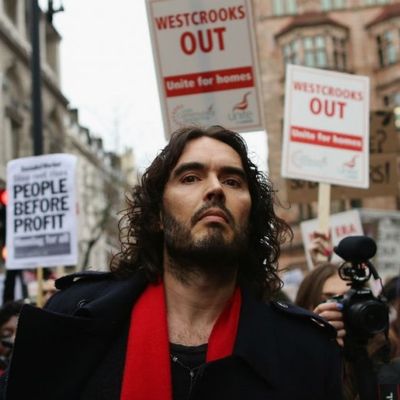
Even those of us who still like Russell Brand might find him a bit too omnipresent in The Emperor’s New Clothes, a documentary collaboration with director Michael Winterbottom (the credit on the film reads as “made by Russell Brand and Michael Winterbottom”) in which the actor/comedian/personality travels Britain and instructs us on the iniquities of modern capitalism … No, you read that right. This is Russell Brand in Michael Moore mode, though it’s unlikely even Moore would draw so much attention to himself. When he’s not talking to ordinary folks who’ve been left behind by the unchecked rampage of free-market fundamentalism of the last several decades, or attempting to interview big bank CEOs with fat paychecks, or staging “wacky” protest stunts, Brand faces the camera and tries to explain some of the forces at play in the modern global economy.
That sounds hopelessly preening — and ironic vanity has at times been part of Brand’s comic strategy — but here it feels less like an act of ego and more like one of self-aware celebrity advocacy. In other words, Brand wants to serve a purpose similar to the various cameos in The Big Short: The concepts are technical and complicated, so here’s a famous face with some pop culture cachet to keep our attention. And as in The Big Short, the effect isn’t consistent. Sometimes the celebrity factor engages us, sometimes it’s just a distraction. But at least it’s better than the empty platitudes from politicians that the film regularly cuts away to (and has marvelous fun with during the end credits).
There’s a personal angle to Brand’s journey, however. Much of his ruminations center around his hometown of Grays, in Essex, not far from London, as he recalls a childhood when the town was filled with small, local businesses. Though he speaks of it in almost utopian terms, he’s also the first to admit that Grays “was never an estuary Shangri-La … In truth, it was always a bit of a dump.” But even that long-forgotten dump, he notes, was an improvement on Grays today, “with its charity and betting ships, its food banks and Wango loans.” The depressed town is now the very vision of monopolized blight. Most local businesses have ceased to exist, and real estate is in the hands of global corporations that don’t bring any tax revenue to the U.K.
It wasn’t always like this, Brand tells us. As in the U.S., the postwar years in Britain saw lots of growth and plenty of taxation. As much as such policies have been demonized by the Right, Brand reminds us that they also gave us eras such as America’s ’50s boom years, and the Swinging London of the ’60s. (“You can have miniskirts and sex and sunshine … and still have a fairer society!”) He interviews aging pensioners who used to work at the oh-so-English Cadbury chocolate factory, and once had well-paying jobs that allowed them to go to college and even have plenty of leisure time. But Cadbury has since been sold to Kraft, and with that have gone the jobs and the benefits, not to mention the quality of the product. (“Their cream eggs are shit now,” Brand observes.)
With so many tricky concepts to discuss, and decades’ worth of economic and social outrages to rail against, all done by a divisive comedian so rarely taken seriously, The Emperor’s New Clothes is a fool’s errand. And it kind of knows it. At times Brand himself admits he doesn’t really understand some of the things he’s talking about. What he’s trying to convey, in his good-natured, half-baked, occasionally entertaining way, is a dull, but insistent feeling of rage. Not just against malfeasance by banks that have illegally manipulated the system, but also against a society that has been systematically dismantled by the economic policies of the last several decades, which has in turn led to a more existential despair. “When have you met anyone who is truly happy?” Brand asks. “Only children, mentally ill people, and daytime televisions presenters … and I’ve been all three.”
But it’s hard not to wish that Brand would step back and just let the numbers and the people do the talking for him. At one point, he interviews a group of employees from the Tesco shopping chain, who put it in very understandable terms. “We know how much a can of baked beans cost a year ago, and how much it costs now,” one woman observes. But they haven’t seen that reflected in their wages, she notes, even though the company’s owners are making more and more. This widening chasm in income is breathtaking — probably the simplest and most compelling fact in Brand’s arsenal. The head of Lloyds Bank, he later notes, made £80,000 in 1980; now, he makes £5 million. If the average worker’s salary had increased by that much in the intervening years, they’d be making £450,000. Brand’s shtick might get old, but the injustices don’t.


